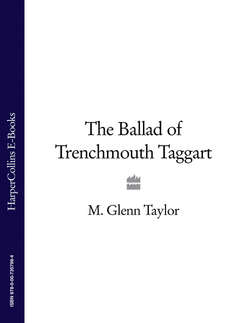Читать книгу The Ballad of Trenchmouth Taggart - Glenn Taylor - Страница 12
FOUR Frank Dallara Fashioned A Tool
ОглавлениеOnce every three months, Ona Dorsett took her children to the Wholesale Grocers in Williamson for evaporated milk, navy beans, sardines, table salt, and toilet soaps, among other things. Once, she’d bought them a nibble of Mungers Fancy Chocolate because the shine business was especially good in winter months.
Just before Thanksgiving 1909, the three of them made a trip. Some folks had Model Ts by then, but the Widow and her two children rode in a canopy-top horse wagon.
Trenchmouth was nearly six, his sister nine, and they couldn’t have been more different. She was in school, he wasn’t yet. She was brave of speech to adults and peers alike, while he spoke as little as possible. This was due not to any lack of intellect, but instead a desire not to show folks the inside of his mouth. So it came to be that when he spoke, he did so with his lips curled over the swelled gums and crooked teeth. A mumbler, some would say. An otherwise good, handsome, brown-haired boy who spoke like someone had soldered his jawbones in such a way as to prohibit full opening.
In the grocers, Clarissa handed her mother items for the sack while Trenchmouth sprinted the aisles, his boots leaving marks when he turned corners. He wasn’t looking where he was headed on one such turn and ended up with a face full of pantleg. From his seat on the tiled floor, he looked up to see who he’d plowed into. ‘I’m sorry sir,’ he mumbled.
The man said nothing. He was tall and thin, and though not yet thirty years old, his face housed wrinkles rivaling a bulldog’s. He stood stooped. His hands carried the permanent black residue of an undergrounder, a miner, just as his father’s had before him. His father had been born in Italy, and it would be another generation before the last name morphed pronunciation, quit carrying the unpleasant ring of an outsider. When he smiled at Trenchmouth, his teeth looked nearly as bad off as the boy’s, and this was comforting. ‘You’re liable to outrun a coal train ain’t you son?’ he said. He was pulling pieces of smooth carved wood from a sugar sack. The wood pieces were lashed with rubber.
Trenchmouth watched him place his wares on the store’s shelf, one by one, lined up.
‘Slingshots,’ the man told him. He looked at the sling shot in his hand for a moment, thought, then handed it to the boy, who had stood back up. ‘Go knock Goliath on his behind,’ he said. Trenchmouth wanted to take the weapon, but he didn’t. Until the man took the boy’s hand in his own and placed it there. Then the man, whose name was Frank Dallara, finished putting his goods on the shelf. ‘They bring in a nickel from most boys. You got a deal on that there.’
‘Thank you sir,’ Trenchmouth said.
Frank Dallara stared at the awkward mouth, the way it hid its own parts. Then he looked the boy in the eye and said, ‘I’d bet my last dollar you’ll be a dead-eye with that weapon in one week. I can see it in you.’
The Widow came up behind him, Clarissa beside her. ‘Frank,’ she said.
‘Missus Dorsett,’ he said and tipped his hat. Something or someone had taken a bite out of the brim. ‘I reckoned this one was yours. Grow like weeds, don’t they?’
‘They do.’
Dallara turned his attention to Clarissa. ‘My boy Frederick is in your class isn’t he young lady?’
‘Yessir he is,’ Clarissa said. ‘He doesn’t say much, but when he does it’s not mean like some other boys.’
‘Well, glad to hear it. He speaks highly of you.’
For once, Clarissa had no response. Her cheeks went a little pink.
‘You’re selling goods Frank?’ Ona said.
‘I’m out of the mines, done for good with it. Too many gettin killed for one contraption foul up or another.’ He looked at her and then at the floor, like he shouldn’t have said such a thing in the presence of a mine widow. ‘I sell these for a little extra, but I’m framing construction over at the Urias Hotel in Matewan.’
‘Well, good. I reckon that’s safer.’
Trenchmouth pulled back on the rubber and extended his arm. He squinted one eye like he’d lined up this shot a hundred times before. He didn’t let the rubber snap back, just stood there still as a statue.
‘I told him I could see it plain as daybreak,’ Dallara said. ‘This boy’s a dead-eye. A crackshot if I’ve ever seen one.’
